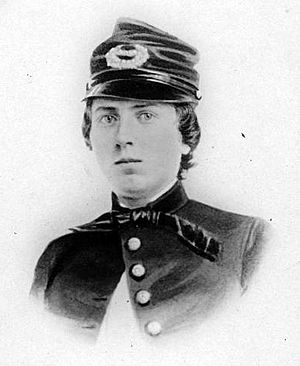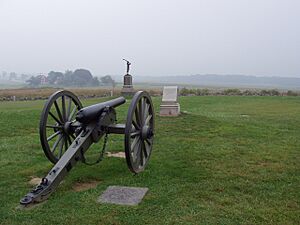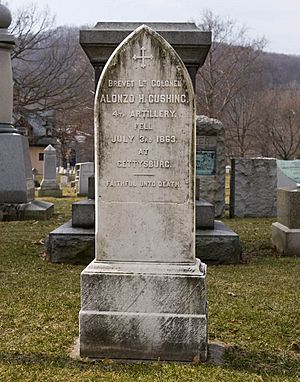Alonzo Cushing facts for kids
Quick facts for kids
Alonzo H. Cushing
|
|
|---|---|

Cushing c. 1861
|
|
| Born | January 19, 1841 Delafield, Wisconsin |
| Died | July 3, 1863 (aged 22) Cemetery Ridge, near Gettysburg, Pennsylvania |
| Buried |
West Point Cemetery,
West Point, New York |
| Allegiance | United States of America |
| Service/ |
United States Army Union Army |
| Years of service | 1861–1863 |
| Rank | |
| Commands held | 4th U.S. Light Artillery, Battery A |
| Battles/wars | American Civil War |
| Awards | Medal of Honor |
| Relations | William B. Cushing (brother) Howard B. Cushing (brother) |
Alonzo Hereford Cushing (born January 19, 1841 – died July 3, 1863) was a brave artillery officer. He fought for the Union Army during the American Civil War. He was killed in action during the famous Battle of Gettysburg. He was defending the Union's position on Cemetery Ridge against a major attack called Pickett's Charge.
Many years later, in 2013, Alonzo Cushing was nominated for the Medal of Honor. This is the highest award for military bravery. The United States Congress approved his nomination. Then, the Defense Department and the President reviewed it.
On August 26, 2014, the White House announced he would receive the Medal of Honor. President Obama held the official ceremony on November 6, 2014. Since Cushing had no direct family left, a distant cousin accepted the medal for him.
Contents
Early Life and Family
Alonzo Cushing was born in what is now Delafield, Wisconsin. He grew up in Fredonia, New York. His younger brother, William B. Cushing, became a famous officer in the Union Navy. Alonzo and William were the youngest of four brothers. All four served in the Union forces during the war. Another brother, Howard B. Cushing, died in 1871 during the Indian Wars.
Serving in the Civil War
Alonzo Cushing finished his studies at the United States Military Academy in June 1861. He quickly became a second and then a first lieutenant. He was later given a special honor called a "brevet major" after the Battle of Chancellorsville. This meant he could act as a major, even if he wasn't officially promoted yet.
Cushing led a group of cannons called Battery A, 4th U.S. Artillery at Gettysburg. He was seen as a hero for his actions on the third day of the battle. He was hit and wounded three times. First, a piece of a shell went through his shoulder. Then, another shell fragment badly wounded his stomach and groin. This injury was so severe that his intestines were exposed. He had to hold them in place with his hand. But he still kept giving orders to his battery!
After these injuries, a higher-ranking officer told him to go to the back for safety. But Cushing refused. There weren't enough men left, and he wouldn't leave his post. His wounds made it hard to shout orders over the loud sounds of battle. So, his 1st Sergeant, Frederick W. Füger, held him up. Füger then passed on Cushing's commands to the soldiers. Cushing was finally killed when a bullet hit him in the mouth. He died right there on the battlefield during the peak of the attack. He was only 22 years old.
His body was sent back to his family. He was buried in the West Point Cemetery in New York. On his headstone, his mother asked for the words "Faithful unto Death." His grave is next to Major General John Buford, another hero from Gettysburg.
Cushing was honored after his death with a "brevet promotion" to lieutenant colonel. This was for his great bravery.
Medal of Honor Awarded
The idea to give Cushing the Medal of Honor started in the late 1980s. A woman named Margaret Zerwekh began writing letters. She lived on land that used to belong to Cushing's father. She spent years learning about his life. For a long time, her letters didn't get much attention. But in the early 2000s, things changed.
In 2002, Senator Russ Feingold nominated Cushing for the Medal of Honor. After a long investigation, the U.S. Army approved the nomination in February 2010. To get the medal, it also needed approval from the United States Congress. On May 20, 2010, it was announced that Cushing would receive the medal. This was 147 years after he died!
However, the plan to give him the medal was removed from a defense bill in December 2012. But in December 2013, the Senate passed a new defense bill that included the award for Cushing. The nomination went to the Defense Department for review. Then, President Barack Obama approved it.
On August 26, 2014, the White House announced Cushing would finally get the Medal of Honor. On November 6, 2014, President Obama presented the award. This was 151 years after Alonzo Cushing's death. Many of Cushing's relatives attended the ceremony at the White House. Cushing officially received the Medal of Honor on December 19, 2014.
Legacy and Remembrance
Many things remember Alonzo Cushing and his bravery.
- The Alonzo H. Cushing Camp #5 of the Sons of Union Veterans of the Civil War is in Ozaukee County, Wisconsin.
- A small state park in Delafield was dedicated to Alonzo and his brothers, William and Howard. It is now owned by the City of Delafield.
- Cushing Elementary School in Delafield is also named after the brothers.
- A stone monument marks the exact spot where Cushing was killed at the Battle of Gettysburg. It's on Cemetery Ridge, at a place called The Angle.
- In 2015, the Military Order of the Loyal Legion of the United States (MOLLUS) honored Lieutenant Cushing.
- NFL Houston Texans linebacker Brian Cushing is a distant relative of Alonzo Cushing.
The poet Stephen Vincent Benet wrote about Cushing's death in his poem "John Brown's Body": "Cushing ran down the last of his guns to the battle-line. The rest had been smashed to scrap by Lee's artillery fire. He held his guts in his hand as the charge came up to the wall, And his gun spoke out for him once before he fell to the ground."
Images for kids
 | Anna J. Cooper |
 | Mary McLeod Bethune |
 | Lillie Mae Bradford |





